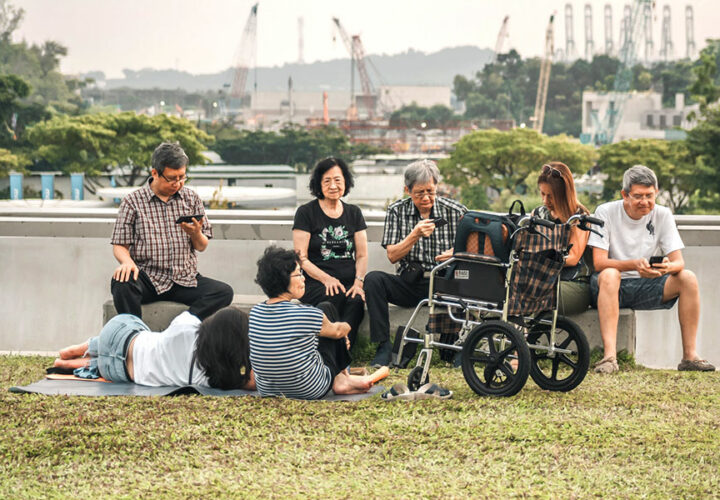After an act of violence against a 73-year-old, 80-pound woman under the guise of law enforcement, Being Patient writer Phil Gutis and dementia care consultant Christy Turner consider a root cause of elder abuse: lack of empathy.
Karen Garner, a 73-year-old woman living with dementia, was walking home from the store when wildflowers growing on the side of the road caught her attention. Stopping to pick some flowers, she was soon approached from behind by a man who started talking to her. Not understanding what he was saying, she shrugged, smiled and turned to walk away.
Once her back was turned, he assaulted her and threw her against the hood of his car. As The New York Times reports, soon a woman emerged from another car but rather than helping Garner, she joined in the continuing assault. The duo “aggressively” pinned Garner’s hands behind her back, “breaking her arm and dislocating her shoulder, hog-tying her.”
As the United Nations and governments around the world marked Elder Abuse Awareness Day on June 14th, the Biden Administration noted that one in ten adults 65 and up experience some form of elder abuse, which can take many forms, including financial, emotional, physical or sexual as well as exploitation and neglect. And for every case of elder abuse that comes to the attention of authorities, the Administration said, it is estimated that 23 cases are never brought to light.
Unlike most incidents of violence against people living with dementia, this assault in June 2020 was captured on video. That’s because the people who assaulted Garner were police officers wearing body cameras. The Garner incident, which took place in Loveland, Colorado, began when she tried to walk out of a Walmart without paying for soda, candy, a T-shirt and wipes.
Walmart associates confronted Garner as she walked out of the store with her $13.88 in goods. Garner offered to pay but the store declined her offer, took the merchandise and called the police because, the store said, she tried to walk off without paying and sought to remove an associate’s mask.
For this, Garner — all of 5 feet tall and weighing only 80 pounds — was assaulted by a total of three police officers. She was brought to a police station and left in a jail cell in pain for more than six hours.
While Garner’s case drew widespread attention and revulsion, the issue of violence against people with neurodegenerative diseases is a largely hidden phenomenon. Volumes have been written about people living with dementia becoming violent but very little has been written about the violence perpetrated against those living with Alzheimer’s or other degenerative brain diseases.
One meta-analysis of dozens of studies found that one in five — or 20 percent — of older adults globally may be physically abused while more than half — up to 55 percent — may be abused in other ways such as emotionally, financially, verbally and sexually (just to name a few). The study, called Dementia’s Hidden Darkness, was published in 2018 by Donald Weaver, a professor at the University of Toronto.
Garner’s case, which has quickly become one of the most highly reported cases of violence against a person with dementia, would have likely remained an untold story if not for the lawsuit filed by Garner. According to her lawsuit, Garner suffers from dementia and sensory aphasia. Both conditions cause impairment in the ability to understand others and the ability to verbally communicate.
A video compiled by Garner’s lawyers, which is very disturbing, can be found here. A different video later captured the first assailant laughing with two others about the assault, bragging, “Hear the pop?” as he dislocates Garner’s shoulder. All three assailants from the first video, as well as the two others laughing in the second video, are police officers; two of the five are supervisors.
Since then, three officers involved in the violent incident have resigned. Two are now facing criminal charges. And, the city of Loveland announced it has hired an independent third party — “one of the nation’s leading law enforcement and public safety consulting firms,” according to the city’s press release — to investigate the Loveland Police Department and assess the department’s policies, practices and procedures in the wake of Garner’s abuse.
Hopefully, change won’t stop with Loveland: The Garner case seems to have encouraged police departments to seek training in how to respond to people living with dementia, including the nearby Steamboat Spring Police Department and other police departments around the state. The Alzheimer’s Association launched such a program in 2014, and said that more than 22,000 first responders have completed it since then, an average of about 3,000 first responders per year. But in the month following the news about Garner, they reported that approximately 1,600 first responders completed a training program — a notable increase.
These first responder courses offer an understanding of what dementia is and how it can affect people with neurodegenerative diseases. They learn best practices for approaching and interacting with people living with cognitive impairment, a critical skill given that law enforcement is tasked with the often lifesaving job of helping to find people with dementia who have wandered from their homes.
For example, best practices in dementia care say that a person living with dementia should always be approached from the front. After that, people trying to communicate should try to create a rapport with the person while gauging their ability to hear and understand what’s being said.
Perhaps communities taking these steps will mean that when law enforcement encounters a person with dementia, there will be less of a chance of misunderstanding and mishandling on the part of the responder. But had these specific officers undergone training, and had a greater understanding of Garner’s state of mind, would they have approached her with more compassion? More humanity?
Training workshops and awareness campaigns can provide essential, fundamental information to first responders about a massively prevalent disease that is only growing increasingly common — but they can’t solve the whole problem. If a person is fundamentally inclined toward violence against an older adult — someone who may be more physically vulnerable than they are — interfacing with older adults should not be part of that person’s job.
Should all law enforcement agencies enlist their personnel in these trainings? Without a doubt. But to prevent cases like Karen Garner’s in the future, they will need to go deeper too, right down to their hiring practices. Training staff is essential to excellence in dementia care in any field. But no amount of training will ever compensate for hiring people who don’t have the heart for the work.
While they can always be further developed, empathy and compassion are traits adults either have or don’t. Garner and the millions of other older adults, including those living with some form of neurodegenerative disease, deserve nothing less from the people we look to to keep our communities safe.
Being Patient is committed to representing a diversity of voices in the Alzheimer’s and brain health community, and to providing a platform to elevate the perspectives of people living with neurodegenerative diseases. Being Patient publishes op-eds at the discretion of the editorial staff. To share an op-ed for consideration, submit concepts or drafts to our managing editor at alex@beingpatient.com.



